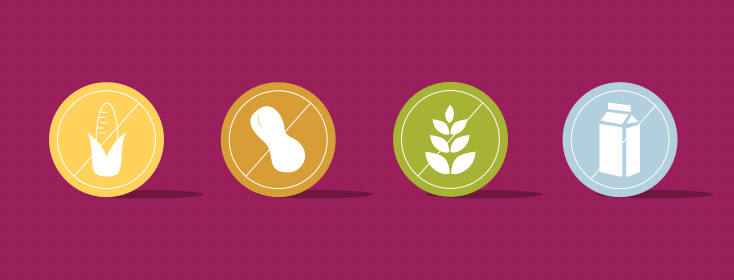What Are Elimination Diets? Your Questions, Answered
An elimination diet is a short-term eating plan that removes specific foods from the diet that may be causing adverse effects in the body. An individual is then able to identify foods that they cannot consume without inducing negative effects. An elimination diet typically involves removing suspected foods from the diet for a period of two weeks to two months to see whether symptoms are reduced or resolved over that period of time. Afterwards, individuals can reintroduce these foods – one at a time if eliminating more than one – to test for symptoms and tolerance.
There are two main reasons for wanting to eliminate foods from the diet: allergies and intolerances.
Allergy
A food allergy is an abnormal immune response to food and may cause symptoms of itchiness, swelling of the tongue and throat, vomiting, diarrhea, hives and/or difficulty breathing (which can escalate to anaphylaxis). These symptoms can occur within several minutes to hours after eating the allergen and can happen from even very small amounts of the food.
Common food allergens are peanuts, eggs, milk, tree nuts, wheat, sesame, soy, seafood, sulphites and mustard. If you have a known or suspected food allergy, it is important to discuss with a medical professional whether an elimination diet is appropriate for you – often times, in IgE mediated ‘true’ allergies it is not – unless supervised by an allergist. Reintroducing a food allergen may trigger anaphylaxis, which can be life-threatening reaction and requires immediate medical attention.
Intolerance
A food intolerance is a reaction to a food or food additive that does not involve the immune system. For example, lactose intolerance is a sensitivity to the natural sugars found in some milk products. These individuals do not produce the enzyme “lactase” in their gut in amounts needed to properly digest milk products, so they experience symptoms of gas, pain, bloating, and diarrhea.
Because a food intolerance is not something that causes damage to the body, an elimination diet may be an appropriate way to determine the types and amounts of foods that you are intolerant to.
Elimination diets
There are two main phases to an elimination diet: the elimination phase and the reintroduction phase. During the elimination phase, suspected foods are eliminated from the diet until symptoms are significantly improved (typically 2-6 weeks). If your symptoms persist after this time, it’s best to notify your doctor or healthcare provider. During the reintroduction phase, you can trial each eliminated food in increasing amounts as dictated by your dietitian or doctor to determine which foods are causing your symptoms and in what amounts.
A common type of elimination diet seen to manage IBS is the low FODMAP diet – where fermentable oligosaccharides, disaccharides, monosaccharides and polyols are reduced, followed by strategic reintroduction to test for symptoms. Depending on the severity and symptoms of your IBS, you may not have to reduce or eliminate all FODMAP’s, rather, just the ones in the doses that may trigger your symptoms.
Ask your doctor or dietitian if an elimination diet is right for you as we often see elimination diets done incorrectly. What we want to know is – are we ACTUALLY measuring what we think we’re measuring? When elimination diets are done incorrectly, we often end up seeing patients unnecessarily restricting foods leading to poorer health. We often only think of the harm in eating foods that make us unwell – but rarely do we think of the harm of not eating a variety of foods – it is important you work with a trained professional when pursuing an elimination diet, as it puts you at risk of inadequate variety, inadequate micronutrients, and may negatively impact your gut microbiome.

Join the conversation